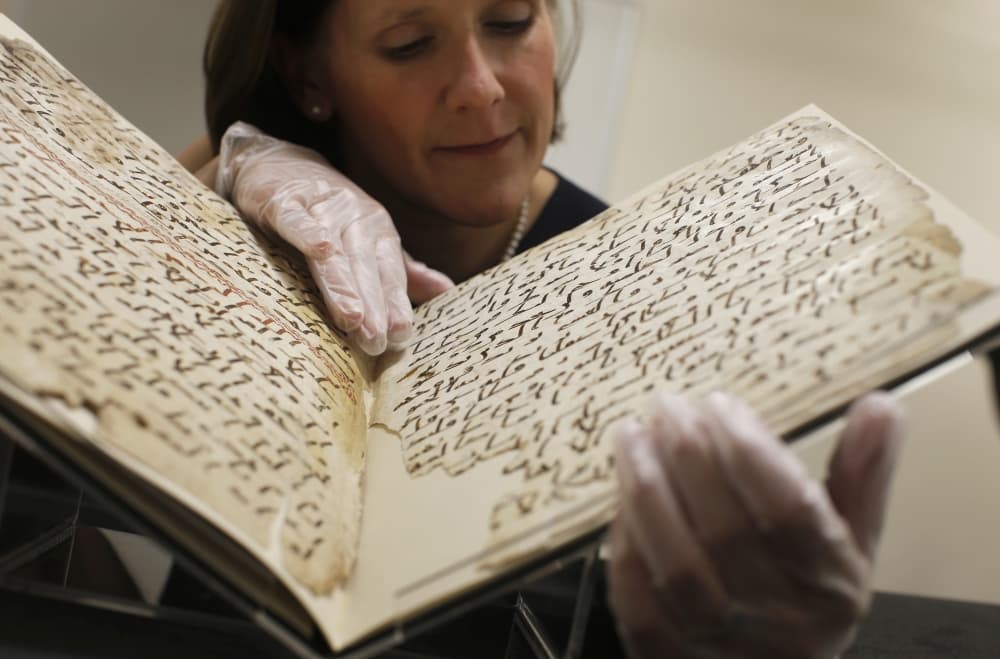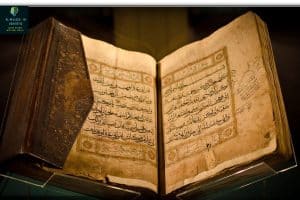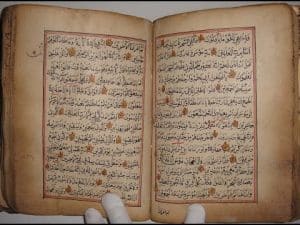What is the Original Language of the Quran?
The Quran is the central religious text of Islam, believed by Muslims to be a revelation from God. It is organized in 114 chapters (suras) which consist of individual verses (ayahs).
The Quran is written in Arabic, and it is considered to be the purest form of the Arabic language.
What is the meaning of “Quran”?
The word “Quran” comes from the Arabic word “qara’a”, which means “to recite”.
The Quran is also sometimes referred to as the “Koran”.
How old is the Quran?
The Quran was revealed to the Prophet Muhammad over a period of 23 years, from 610 CE to 632 CE.
The Quran is believed to be the final revelation from God to humanity.
Who wrote the Quran?
Muslims believe that the Quran is the word of God, revealed to the Prophet Muhammad (peace be upon him) through the angel Gabriel.
The Prophet Muhammad did not write the Quran himself, but he memorized it and recited it to his companions.
After the Prophet Muhammad’s death, his companions compiled the Quran into a single book.
Key figures who contributed to the compilation of the Quran:
- Abu Bakr: The first caliph, ordered the compilation of the Quran.
- Zayd ibn Thabit: The Prophet’s scribe, assisted in compiling and arranging the Quran.
- Umar ibn al-Khattab: The second caliph, helped spread the Quran among Muslims.
The Quran is the holy book of Islam and the primary source of Islamic law.
Muslims believe that the Quran is an everlasting miracle and proof of the Prophet Muhammad’s prophethood.
The Quran is the preserved word of God, protected from distortion and change.
Recited worldwide, the Quran is translated into numerous languages.
The Quran serves as a source of guidance and inspiration for Muslims globally.
Additional Information:
- The Quran revealed to the Prophet Muhammad over 23 years.
- The revelations occurred in Mecca and Medina.
- The Quran the final revelation from God.
The Quran is a rich source of information about Islam and a source of inspiration for Muslims worldwide.
What religion does the Quran belong to?
The Quran is the holy book of Islam.
Muslims believe that the Quran is the word of God, and they revere it as the most important source of guidance in their lives.
Where did the Quran come from?
Muslims believe that the Quran is the word of God, revealed to the Prophet Muhammad (peace be upon him) through the angel Gabriel.
According to Islamic belief, the revelation of the Quran began in the month of Ramadan in the year 610 CE, in the Cave of Hira in Mecca.
The Quran was revealed to the Prophet Muhammad over a period of 23 years, until his death in 632 CE.
The Quran was revealed to the Prophet Muhammad in segments, and Gabriel would transmit it to him at various times.
The Prophet Muhammad would memorize the Quran and recite it to his companions, who would also memorize and recite it.
After the Prophet Muhammad’s death, his companions compiled the Quran into a single book, under the command of Abu Bakr, the first caliph.
What is the origin of language according to the Quran?
The Quran provides insightful perspectives on the origin of language, with several verses supporting this topic:
- Allah’s Teaching of Names to Adam:
- Allah says in the Quran, Surah Al-Baqarah, verse 31: ”
“وَعَلَّمَ آدَمَ الْأَسْمَاءَ كُلَّهَا ثُمَّ عَرَضَهُمْ عَلَى الْمَلَائِكَةِ فَقَالَ أَنْبِئُونِي بِأَسْمَاءِ هَؤُلَاءِ إِنْ كُنْتُمْ صَادِقِينَ”‘
This verse indicates that Allah taught Adam all the names, implying that language originated from Allah.
- Allah’s Creation of the Arabic Language
- Allah says in the Quran, Surah Fussilat, verse 44:
“إِنَّا أَنْزَلْنَاهُ قُرْآنًا عَرَبِيًّا لَعَلَّكُمْ تَعْقِلُونَ”
This verse indicates that the Arabic language is the language of the Quran, highlighting its importance and status.
- The Diversity of Languages:
- Allah says in the Quran, Surah Ar-Rum, verse 22:
وَمِنْ آيَاتِهِ خَلْقُ السَّمَاوَاتِ وَالْأَرْضِ وَاخْتِلَافُ أَلْسِنَتِكُمْ وَأَلْوَانِكُمْ إِنَّ فِي ذَلِكَ لَآيَاتٍ لِلْعَالِمِينَ”
This verse points to the diversity of languages as one of Allah’s Signs, demonstrating His power and greatness.
Conclusion:
The Quran suggests that language originated from Allah, that Arabic is the language of the Quran, and that the diversity of languages is a Sign of Allah.
However, the Quran does not explicitly specify the process of language development, leaving room for scientific research and various interpretations.
Some of the major interpretations of the Quranic perspective on the origin of language include:
- Divine Instruction:
- Some scholars believe that Allah directly taught Adam language.
- Natural Evolution:
- Some scholars believe that language naturally evolved through human interaction with the environment.
- Innateness:
- Some scholars believe that language is innate in humans, and Allah facilitated its discovery and use.
If you’re looking to deepen your understanding of language according to the Quran , We offer comprehensive courses that explore the beauty and power of supplication in more detail.
What is the original language of the Quran?
The original language of the Quran is Arabic.
The Quran has been translated into many languages, but the Arabic text is considered to be the original and most authentic version.
What language was spoken before the Quran?
The language spoken before the Quran was Arabic.
The Quran is believed to be the first book written in Arabic.
Which language was the Quran written in?
The Quran was written in Arabic.
The Arabic language is considered to be the purest form of the Arabic language.
Read Also :BEST WAY TO LEARN TO SPEAK ARABIC
What are the 7 dialects of the Quran?
The seven dialects of the Quran (الأحرف السبعة) refer to the seven different ways in which the Quran was revealed to the Prophet Muhammad (peace be upon him).
These dialects are:
- Quraysh (قريش): The dialect of the Quraysh tribe, which was the tribe of the Prophet Muhammad.
- Hudhayl (هذيل): The dialect of the Hudhayl tribe, which was a neighboring tribe to the Quraysh.
- Taym (تيم): The dialect of the Taym tribe, which was another neighboring tribe to the Quraysh.
- Hawaazin (هوازن): The dialect of the Hawaazin tribe, which was a tribe from central Arabia.
- Thaqeef (ثقيف): The dialect of the Thaqeef tribe, which was a tribe from southern Arabia.
- Kinaanah (كنانة): The dialect of the Kinaanah tribe, which was a large tribe from northern Arabia.
- Yemen (اليمن): The dialect of the people of Yemen, which is a region in southern Arabia.
It is important to note that these dialects are not mutually exclusive, and there is often overlap between them.
For example, the dialect of the Quraysh is very similar to the dialect of the Hudhayl, and the dialect of the Taym is very similar to the dialect of the Hawaazin.
The seven dialects of the Quran are a testament to the rich diversity of the Arabic language, and they provide a valuable insight into the early history of Islam.
Furthermore, if you’re curious about expanding your spiritual knowledge and practices, explore our QURAN READING BASICS courses here. We provide a range of courses designed to enhance your spiritual journey and connection with your faith.
What Arabic dialect is closest to the Quran?
The Arabic dialect that is closest to the Quran is the Hijazi dialect.
The Hijazi dialect is spoken in the region of Mecca and Medina, where the Quran was revealed.
What is the most accurate Arabic dialect?
There is no one “most accurate” Arabic dialect.
All dialects of Arabic are valid and accurate.
Read Also :WHICH ARABIC DIALECT SHOULD I LEARN?
Is it true that about 60% of the Koran has been changed from its original content?
No, this claim is not true.
There is no scientific or historical evidence to support this claim.
The Quran is believed to be the same Quran that was revealed to the Prophet Muhammad (peace be upon him) over 1400 years ago.
There are many evidences that support this claim, including:
- Tawatur:
- The Quran was transmitted through tawatur, which means that it was transmitted from person to person through an unbroken chain of narrators.
- Memorization:
- The Quran has been memorized by millions of Muslims around the world, making it very difficult to change without anyone noticing.
- The Arabic Language:
- The Arabic language is the language of the Quran, and it is a rich and complex language, making it very difficult to change the content of the Quran without affecting its style and beauty.
However, there are some variations in how the Quran is recited.
These variations are minor and do not affect the content of the Quran.
These variations include:
- Qira’at:
- There are seven agreed-upon readings of the Quran, which differ in how certain words are pronounced.
- Tajweed:
- There are rules of tajweed that govern how the Quran is recited, and these rules vary from country to country.
Therefore, it can be said with confidence that the Quran is the same Quran that was revealed to the Prophet Muhammad (peace be upon him) over 1400 years ago.
There is much scientific and historical evidence to support this claim.
Read Also : I know that the concepts are overlapping for many new Muslims and even old Muslims, so we, at Al-Walid Academy, offer you a distinguished group of courses, but given the previous recent common question, I recommend an ISLAMIC STUDIES COURSE for you,click now and start your journey with us .
Conclusion
The Quran stands as the cornerstone of Islam, a divine guide offering wisdom and direction to Muslims worldwide. Believed to be the final revelation from God, delivered in its purest form through Arabic, the Quran’s message transcends cultures and continues to inspire faith and practice for over 1.8 billion people.
This conclusion emphasizes:
- The Quran’s central role in Islam: “cornerstone of Islam”
- Its divine origin: “divine guide”
- Universality: “transcends cultures”
- Lasting impact: “continues to inspire”





